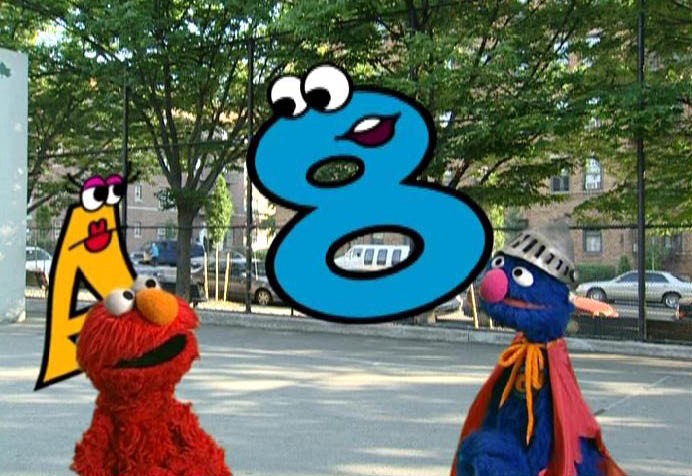The Secret Lives Of Numbers
by Rachel Ahrnsen

Nine is unequivocally the worst number. I say this with authority, because I know numbers. This is not because I’m some kind of mathematical prodigy; I’m barely proficient. However, I do have synesthesia. Synesthesia is a neurological phenomenon where the senses get a bit jumbled. Synesthetes may hear colors, or taste sounds. My version of synesthesia includes ordinal-linguistic personification, which gives my letters colors and my numbers distinct personalities and genders.
I’ll give you the lay of the land. My numbers only have distinct personalities from Zero to Thirteen. All other numbers are products of relationships between those numbers. For example, Fifty-Four is the product of multiplying Six and Nine. Six and Nine loathe each other (boy drama) and hate to cooperate, so Fifty-Four might have some residual angst, but it doesn’t inherently have a personality of its own.
The numbers that do have personalities have character in spades. I picture Nine, my least favorite number, as the evil stepmother in Snow White. Tightly clenching her fading beauty, she attempts to seduce flashy Seven and stalwart Eight. She and Six are embroiled in a bitter rivalry over the affections of Seven. Nine revels in her jealous vanity, and her goal is to undermine the hopes and dreams of all numbers. This is why grocery stores sneakily label items with Nines. For example, $4.99 instead of the more honest $5.00. This is a PSA. Nine is a con artist.
As you might imagine, math has always been a challenge. Each equation is like the Jerry Springer show. I have to prevent Six and Nine from tearing each other’s metaphysical hair out, console Four because she feels lonely, and make sure adorable Two is being shielded from all the nonsense around him.
During math classes, I would easily get distracted by the telenovela playing out on the graph paper. I would try to rearrange numbers so they would be next to their friends, refused to divide certain numbers, and attempted convoluted peacemaking strategies. My teacher referred to my Sun Tzu level mathematical tactics as “thoughtless mistakes.” If only she knew.
The only math I’m good at is multiplication and division. Take 4×7=28. Could I ever forget the youthful, unrequited love story that played out when Four and Seven were placed together? Never! Each time I multiplied two numbers together, a one act play took place. Obviously, my times tables were on point.
I didn’t realize I had synesthesia until I was 16. At this point, I had only told a few friends about my outspoken numbers, due to a healthy sense of self-preservation. One of my friends, who also belonged to my legion of math tutors, diagnosed me. We were in class when she grabbed my elbow. Frantically pointing to a Wikipedia article on synesthesia, she excitedly mouthed, “You have this! I think you have this!”
Learning about synesthesia was the thrill of my young life. The next week was spent devouring anything I could find on synesthesia, and taking a battery of online tests to diagnose myself. It was astonishing to learn that something I had accepted as a quiet little quirk was real. And, bonus, I had a cool fact about myself to use at ice breakers! (Though can we please ban ice breakers as a concept?)
And there were other people like me, some of whom had almost supernatural sensory powers. A woman who sees sounds made a mile away shimmering in front of her. A man who tastes bacon whenever he hears the word, “jail.”
Compared with InstaBacon, my superpower is super boring: The numbers help my finances. Money is just numbers with influence. So I think about money the same way I think about numbers: with a lot of creativity.
For example, sometimes a purchase will make me irrationally angry due to the meddling sales tax. Those damn percentages going around messing with my numbers. Like, I can’t believe what the sales tax did to my happy fifty-dollar purchase! Fifty is such a nice, round number, WHY DID YOU HAVE TO RUIN IT?! (Though now that I think about it, I suppose most people aren’t incredibly fond of sales tax.)
Despite the accompanying annoyances, synesthesia gives me a valuable gift: I have a deeply ingrained respect for numbers, and thus, money. This respect prevents me from making a lot of mistakes. When money is a “real” entity, it cannot be casually ignored, or put off until later. I am virtually incapable of recklessly spending money. Every transaction is an equation, and I don’t enter into those lightly. My money is always in the room with me, and it has a loud voice.
I don’t know how other people see money. I don’t understand how some people treat numbers like they don’t matter. Numbers, unfortunately, determine your fate. It’s good to be on a first name basis with them.
The way I see my financial world may be a tad different. I see an arbitrary, complex equation invented by society. I visualize my life as an ever expanding and shrinking mathematical problem. Subtract living costs. Add expenses. Like a rippling piece of silk, my life is woven with digits, numbers flowing in and out.
I am the constant. Taxes, rent, the New York Stock Exchange, the value of oil, are all part of this constantly undulating equation. We’re all just variables in the insane equation of life.
But as long as you avoid Nine (and payday loans, according to the financial gurus) the equation might just work in your favor.
Rachel is a freelance writer living in the unexpected paradise of Birmingham, AL. She is frantically attempting to keep her basil plant alive.
Support The Billfold
The Billfold continues to exist thanks to support from our readers. Help us continue to do our work by making a monthly pledge on Patreon or a one-time-only contribution through PayPal.
Comments